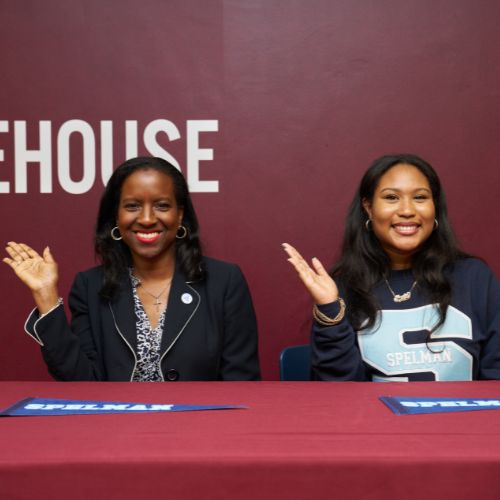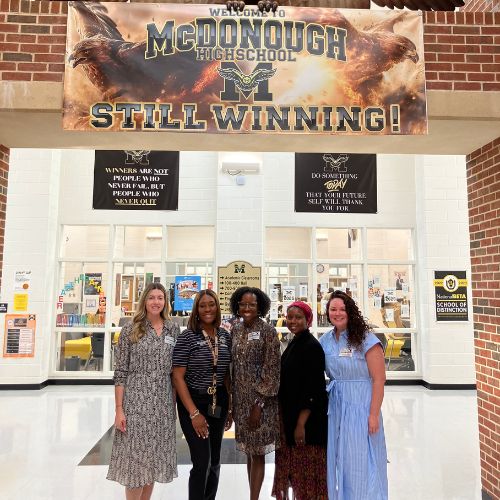Spelman College Partners with NEON to Expand Access to College-Level Courses for Underserved Students
Bringing Spelman’s Classroom to High School Students Nationwide
 Spelman College is expanding its innovative partnership with the newly renamed National Education Opportunity Network (NEON), formerly the National Education Equity Lab. The collaboration, which brings college-credit courses to high school students from Title I schools across the country, has rapidly grown at Spelman from one class and 50 students in Spring 2023 to nearly 300 students and two classes in 2025.
Spelman College is expanding its innovative partnership with the newly renamed National Education Opportunity Network (NEON), formerly the National Education Equity Lab. The collaboration, which brings college-credit courses to high school students from Title I schools across the country, has rapidly grown at Spelman from one class and 50 students in Spring 2023 to nearly 300 students and two classes in 2025.
The partnership launched with “The Education of Black Girls,” a course taught by Andrea Lewis, Ph.D., director of the Student Success Program and an associate professor of education. This fall, Spelman introduced a second NEON course: “African Diaspora and the World,” taught by Chatee’ Omísade Richardson, Ph.D., assistant professor and coordinator of field and clinical experience in education.
“The growth has been outstanding,” said Lewis. “To be able to offer a college-level course to high school students in underserved communities has been transformational. Spelman has always been community-oriented, but this has taken our mission to the next level. It speaks directly to high school students’ continued interest in HBCUs and recent national trends in increasing admission rates at HBCUs.”
What began as a single course has grown into a powerful model for access and opportunity —one that continues to inspire collaboration between Spelman and NEON.
“With 60% of NEON scholars identifying as female and 93% of students self-reporting as students of color, we are honored to not only bring rigorous courses but also ones that have proven to be deeply impactful for our scholars,” said Laura Moore, chief higher education officer with NEON. “The Education of Black Girls extends beyond the classroom in ways course offerings may not. We’ve had co-teachers, students, and teaching fellows express the intergenerational impact it has had on them to be able to discuss topics of race, gender, and class and how it has changed and not changed over time. Co-teachers and teaching fellows have also expressed how it has made them think more critically providing affirming spaces in the classroom.
Since 2019, NEON has partnered with top colleges and universities to bring rigorous, college-credit-bearing courses to Title I high school students at no cost. Title I high schools are government-identified schools where 40% or more of students get free or reduced lunch, mostly serving students of color. The aim is to demystify higher education and increase college access and persistence among students from historically underserved backgrounds.
“As one of our early partners in the network of colleges and universities, Spelman has played a critical role in expanding access to rigorous college courses to Title I (low-income) high schools across the country,” said Moore.
Guided Growth: High School Access to a Rigorous College Experience
 Lewis’ course is a modified version of the same class she teaches undergraduates, tailored slightly to be accessible for high schoolers without sacrificing academic rigor. Students complete weekly assignments, engage in guided discussions, and receive feedback from Spelman teaching fellows —undergraduate students identified by Lewis who support instruction and mentorship.
Lewis’ course is a modified version of the same class she teaches undergraduates, tailored slightly to be accessible for high schoolers without sacrificing academic rigor. Students complete weekly assignments, engage in guided discussions, and receive feedback from Spelman teaching fellows —undergraduate students identified by Lewis who support instruction and mentorship.
“I create a video lecture to introduce each topic, and the teaching fellows meet with the high school students weekly to lead discussions,” explained Lewis. “The fellows also grade assignments and provide support throughout the course with my guidance. Last semester, I had nine fellows working with students across several schools.”
Since the partnership began, NEON reported that Spelman has reached 767 talented scholars from 47 schools and 19 cities, including New York City, McDonough, Georgia, Jackson, Mississippi, Nashville, Tennessee, Charleston, South Carolina, and Washington, D.C. Spelman has inspired many scholars to enroll and persist in college. Eighty-eight percent of students have reported that taking their Spelman course helped prepare them for college.
The impact is already felt at the College. To date, 12 NEON alumni have enrolled at Spelman, including a notable success story: “Last year, a point of pride, one of my teaching fellows was actually a first-year Spelman student who had taken the course in high school,” said Lewis. That was a full-circle moment.
From High School Scholar to Spelman Leader: Maya Reyes’ Journey
One of those scholars is Maya Reyes, C’2028, a political science major at Spelman. Originally from New York, Reyes is a Bonner Scholar committed to civic engagement, youth education, and creating meaningful change through service.
Reyes first encountered Spelman through NEON as a high school student, when she enrolled in The Education of Black Girls — the very course that launched Spelman’s partnership with NEON.“In high school, I was drawn to take the Education of Black Girls course because I had already participated in several courses through the National Education Opportunity Network,” Reyes recalled. “My teacher, who oversaw students in these courses, enrolled me in the course because I had shared with him previously that Spelman was among my top choices for college.”
Taking the course challenged her to grow both academically and personally. “One of the biggest challenges that I faced while taking a college-level course in high school was the level of autonomy and independence that was required of it,” Reyes said. “With these courses, you had to be in charge of your own education. If I was going to miss a TF (teaching fellow) session, it was my responsibility to email my teaching fellow and let her know. Or even just showing up prepared to our sessions, well-versed on the required readings or media for the week. These are components that I continue to partake in today. It is important to connect with your professors, and I believe this is when I first learned that.”
For Reyes, the course became a defining moment in her journey toward higher education. “Before that experience, I often questioned whether I could keep up with the pace and expectations of higher education,” she said. “Overall, I feel that I had a very non-linear pathway to college, as I navigated different opportunities and challenges along the way. I do truly believe the National Education Opportunity Network courses came at such a perfect time. I had the opportunity to build confidence, clarify my goals as a student, all while earning college credit.”
Today, Reyes gives back as a teaching fellow with NEON, mentoring high school students in the very same type of college-level courses that once shaped her path. On campus, she’s active in the Morehouse-Spelman Pre-Law Society and the Spelman Model United Nations team and interns with the Jane Goodall Institute, connecting environmental conservation with education and community action. Looking ahead, she hopes to pursue a career in public policy and urban planning to expand access and equity in education systems.
Educators See Transformation Beyond the Classroom
Reyes' experience is just one example of how Spelman’s collaboration with NEON is shaping the next generation of scholars. Faculty members have witnessed firsthand how these courses prepare students academically and help them explore their identities and global connections.
“Students gain a deeper understanding of their place in the world. They become less U.S.-centric and more globally connected. They grow in the understanding that people who look like them have made significant contributions to the world. This is happening as they begin to understand who they are as students/scholars. They gain a more positive self-concept and connect with their roots in the most beautiful way,” Richardson said.
This spring, Spelman is on track to serve an additional 400 scholars, noted Moore. “Moving forward, we are excited to continue working with Dr. Lewis and Dr. Richardson to further expand the reach of their courses while also welcoming additional Spelman faculty into the partnership.”
As Lewis sees it, this work is just the beginning: “This partnership has evolved beyond just a pipeline — it’s a real bridge between Spelman and the next generation of scholars. And we're only getting started.”
